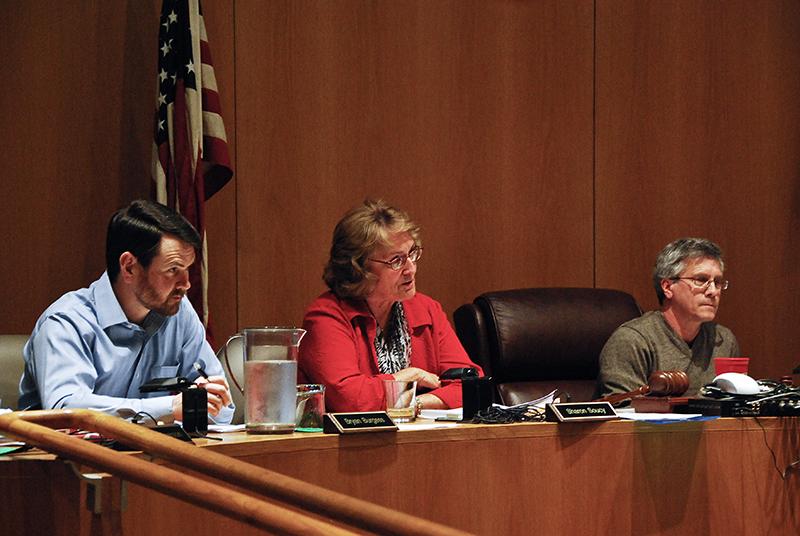Polarized Council Decides Against Releasing Goals
Council member Bryan Burgess, Council Vice President Sharon Fairchild-Soucy and Council President Scott Broadwell participate in a Council meeting on Monday. At the meeting, Council, divided between those who think City Manager Eric Norenberg should be replaced and those who believe he should stay, decided not to release its goals for Norenberg.
April 10, 2015
City Council decided at Monday’s meeting not to release the projected goals for City Manager Eric Norenberg, whose resignation was requested by four out of the seven City Council members in January. Instead, the Council opted to hold a seventh private executive session to discuss the goals that were brought forward in lieu of a conclusive vote on Norenberg’s dismissal.
According to the written agenda for the meeting, the Council had planned to approve the goals and make them public. But when the goals came up in this meeting, Council member Bryan Burgess objected because he felt the goals written down didn’t match the rules agreed upon in the previous meetings.
“At the last meeting, we agreed we needed to come together for another executive session,” said Council member Kristin Peterson.
In response, several other Council members voiced disagreement about whether they had indeed come to a conclusion in the previous meeting or if they had agreed to have another meeting about it.
“After six executive sessions and eight and a half hours of discussion, it seems we are not quite done yet,” said Council President Scott Broadwell, eyes downcast as he lightly massaged his temple.
At the meeting, several Oberlin citizens expressed frustration with how the Council was dealing with Norenberg as well as other issues such as local employment.
“The Council is crippled right now,” Council Vice President Sharon Fairchild-Soucy said later to the Review. “I don’t know what will heal the rift in the Council because it’s strong and it’s deep and it’s not very well understood by us. It seems to me on one side we have all these new [Council members] who want to get rid of the city manager, but they haven’t really articulated what they’re unhappy about.”
When asked if problems about communication and unity within the Council could be rectified, Fairchild-Soucy said, “I don’t think current problems can be rectified with this Council. We have a new election in November, and I’m looking forward to Council changes so the city can be governed more effectively.”
Broadwell also seemed to have low expectations about the possibility of reconciliation in this current City Council.
“I think it’s ridiculous,” Broadwell said. “We’ve already had six executive sessions. We don’t need a seventh. I think they are hateful and vindictive, and they’re trying to get back at Eric. Why? I’d prefer not to say. … Let’s just say I’m very much looking forward to the new election in November.
When asked about the possibility of repairing the breach on City Council, Council member Sharon Pearson, who signed the request for Norenberg’s resignation, said, “Since the letter requesting Norenberg’s resignation was released, I see an improvement in communication between Council members. … I think we can all move forward if we can believe we can do it. It’s a matter of attitude and belief.”
Pearson also said that the causes of this rift between two polarized sides of the City Council were reflected in the disparity in the time served by members — the veterans versus three newly elected members of the council — and their opposing views about how effectively the city was being run.
“We have this newer segment of the Council that’s more progressive, and Oberlin is a community that prides itself on innovative and creative change,” Pearson said. “It is my belief we have a status quo way of doing things right now; we’ll only do things if it’s comfortable or if it’s the right time. In my opinion, we should always be working on these things.”
Pearson also indicated that another point of contention was what she saw as the older Council members’ inability to communicate effectively with newer Council members about correct City Council procedure.
“There’s this thing where people say, ‘That’s the way we’ve always done it.’ Well, I’m new and I don’t know the way we’ve always done it. … It would be great if we could see some of our City Council members mentoring people.”
Pearson also said she would have treated the City Manager issue differently if she had had more guidance and experience.
“The way this whole resignation thing played out, we didn’t do it right,” she said. “But as a City Council member, I wish I had a packet or something so I could know how to handle it properly.”
Pearson also said that she disagreed with Fairchild-Soucy and Broadwell’s claim that the criticism of Norenberg was vague and unfounded.
“Among other problems, Norenberg failed to complete the evaluations of the department heads, and if you look at his job description, that’s part of his job. I think if there were anything essential that we were to do that we chose not to do, we would be called in by our supervisors.”
In an interview with the Review, City Manager Norenberg defended his work and emphasized the need for stability during a critical time in city government, citing the important vacancies to fill such as police chief and fire chief.
“At the current time, I think I’m the best person here who’s able to be the city manager,” Norenberg said. “We have a lot of projects going on right now, a lot of vacancies to fill. I’m committed to working with Council members and I hope we make progress towards that. There’s been some lack of unity and dysfunction for the Council as a whole, and that’s been evident long before my evaluation started.”





















